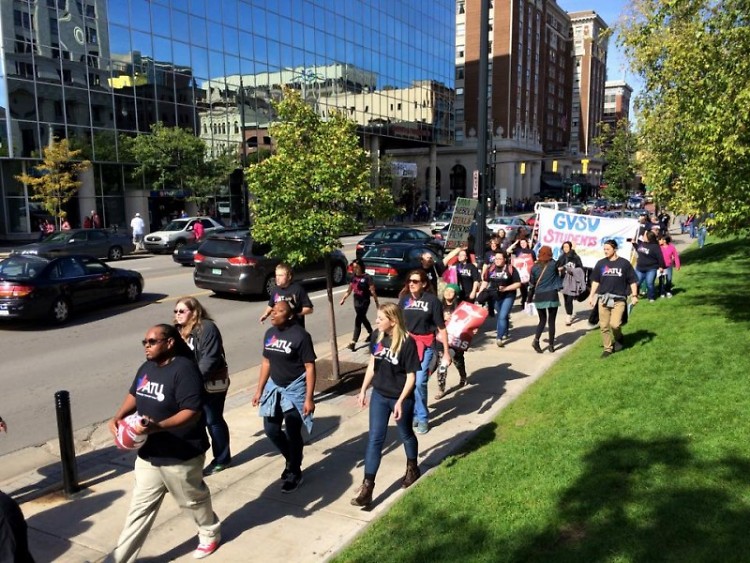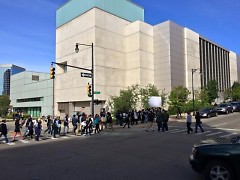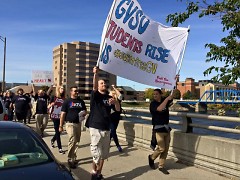Today, Rapid bus drivers protested against recent fare increases and proposed pension plan cuts. They were joined by Grand Valley's United Students Against Sweatshops club, an organization that conducts campaigns to raise living standards for lower and working class citizens.
On Saturday, Rapid bus drivers and Grand Valley State University students joined together to march and flash mob downtown. What were all those people protesting about? No, this event wasn’t part of ArtPrize 7, although it was one of the few events happening at Rosa Parks Circle this week that was unrelated to the festival.
Citizens and drivers came together to raise awareness and publicly protest recent changes with The Rapid.
“It’s important to band together for a common cause and to fight for people whose rights have been disrespected,” says Emily Dusicska, a GVSU student and member of United Students Against Sweatshops.
Bus fares have recently been raised 16%, an amount that might seem trivial until one calculates a daily rider’s monthly increase. Taking just one round trip per day would now cost $15 more per month per person, an increase that can be difficult for a family living near the poverty line to handle. Even the Rapid’s 10-ride passes, which are a more common method of payment for Rapid frequenters, increased in price by $2, from $11.50 to $13.50.
This fare raise has coincided with Rapid administration’s consideration of replacing Rapid bus drivers’ pension plans with plans that are similar to 401(k) plans.
“It’s a risk. Essentially, they’re taking away our pension because a 401(k) plan is just an account. It’s not a plan,” says Amalgamated Transit Union (ATU) President RiChard Jackson. While pension plans are offered on behalf of employees, the replacement plans will be similar to savings accounts that bus drivers have to pay into themselves.
Furthermore, the Rapid transit system's CEO, Peter Varga, accepted a $4,000 raise to his salary in August, putting his annual earnings to over $200,000.
Grand Valley students utilize the bus system, especially route 50, on a daily basis and were supportive of bus drivers’ demand for better retirement options.
“I take the bus from Allendale all the way to my house, which requires one transfer in the morning, and one transfer on the way home. They changed the bus route this year, and it made my commute about 20 minutes longer each way,” one student, who asked to remain anonymous due to his family's current financial difficulties, said of recent route 50 changes.
It seems that many of the recent Rapid changes have affected lower and working class riders, as well as students, in a disproportionate way. Until their voices are heard, protesters plan on marching again and again.
The Rapidian, a program of the 501(c)3 nonprofit Community Media Center, relies on the community’s support to help cover the cost of training reporters and publishing content.
We need your help.
If each of our readers and content creators who values this community platform help support its creation and maintenance, The Rapidian can continue to educate and facilitate a conversation around issues for years to come.
Please support The Rapidian and make a contribution today.


